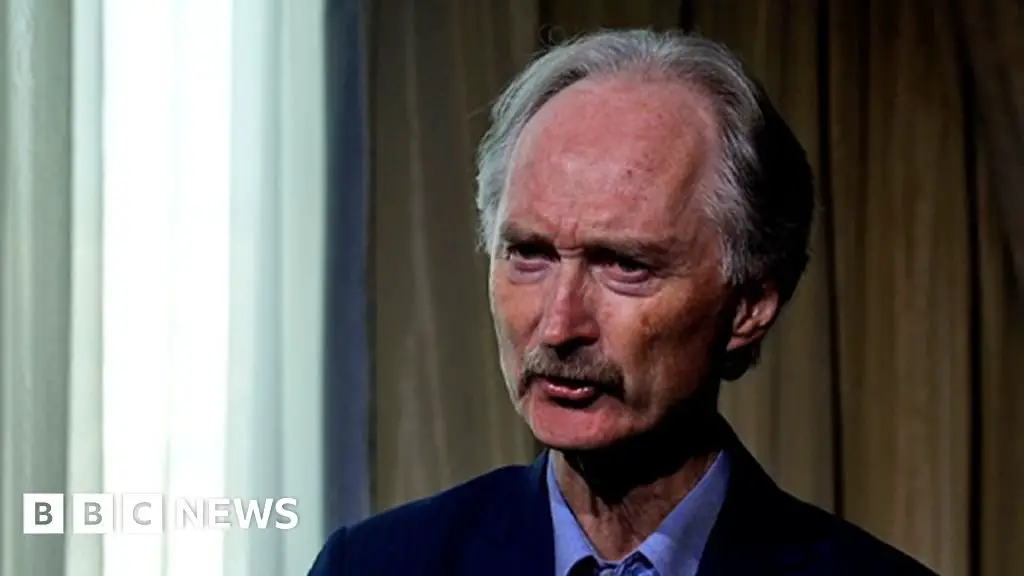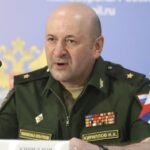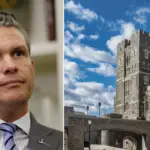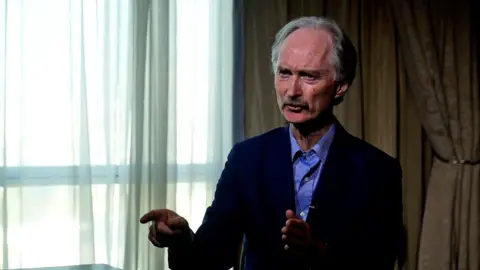 BBC
BBCAccording to UN special envoy Geir Pedersen, it is crucial that Syria’s new leadership keeps its promises to respect the rights of all different religious and ethnic groups in the country.
Mr Pedersen, speaking to the BBC in Damascus, said Syrians were experiencing “a lot of hope and a lot of fear” at the same time.
He called on all parties inside and outside Syria to do everything possible to create stability in the country.
The regime of Bashar al-Assad was brought down less than two weeks ago by a rebel coalition led by Hayat Tahrir al-Sham, known as HTS, a Sunni Islamist group that claims to have denied its jihadist extremist past since splitting from al-Qaeda in 2016.
HTS is designated a terrorist organization by the UN, US, EU, UK and others.
Symbolically, their leader has given up his military pseudonym Abu Mohammed al-Jolani reverted to his real name, Ahmed al-Sharaa.
Sunni Muslims are the majority in Syria, which has a strong secular tradition. Sharaa insists that HTS is a religious nationalist movement that is willing to tolerate other groups.
Mr Pedersen said Sharaa said “a lot of positive things”. But some Syrians, he said, did not believe the HTS leader, who until 2016 had a long history as a jihadist extremist.
“I have to be honest. I hear from many Syrians that they are asking whether this will actually be implemented. They have their doubts.”
That’s not surprising given the speed of change in Syria, he said.
“If the transition is to succeed, it must be a cooperative process.”
“(Sharaa) needs to work with the various armed factions that have worked with him. He needs to work with a broader group of former opposition figures. He must ensure that he works with a broad group of women from civil society. And so. “We all agree with the broadest possible spectrum of Syrian society.”
Mr Pedersen, who has been a UN special envoy since 2018, said the international community was ready to help and support Syria’s new leadership.
He stressed that the hope of lifting sanctions against Syria and removing HTS from the terrorist list depends on his behavior.
He hoped to give him the benefit of the doubt for three months – the period in which HTS has said its interim government will govern ahead of a longer-term agreement.
“I think there is a consensus that for Syria to be truly successful, Syria needs to be delisted and sanctions lifted. But I also think it’s very important to understand that this isn’t just going to happen because everyone wants positive things.”
“Member states are following very closely what will happen on the ground, but I believe that if what has been said in public is actually put into practice, then yes, then I think we will see delisting and the end of the sanctions can be expected.” “
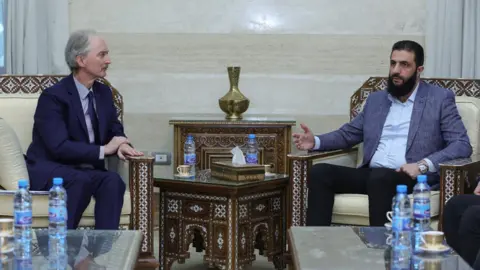 A LOT
A LOTAs for Syria’s neighbors, Mr. Pedersen said Israel’s actions since the fall of Assad have been “highly irresponsible.”
Since the 1967 Middle East War, Israel has occupied and later annexed the area in southern Syria known as the Golan Heights. Most countries other than the United States consider the Golan to be occupied land.
Israel’s recent bombing of Syrian military facilities and its occupation of additional Syrian land in the demilitarized buffer zone of the Golan Heights and adjacent areas, Pedersen said, “pose a threat to the future of Syria and these activities must stop immediately.”
“There is no reason why Israel should occupy new Syrian territory. The Golan is already occupied. They don’t need new land to be occupied. So we have to see that Israel also acts in a way that doesn’t destabilize this.” “It’s a very, very fragile transition process,” he added.
Mr. Pedersen is also concerned about the complex power structure in northern Syria.
Turkey has a well-established relationship with HTS. It has troops in the northwest as well as a militia called the Syrian National Army (SNA), made up of rebel groups it supports.
Since Assad’s fall, the SNA has attacked the other force in northern Syria, a U.S.-backed Kurdish-led militia alliance called the Syrian Democratic Forces (SDF).
Mr Pedersen said it was in Turkey’s interest to follow certain key principles together with other foreign powers.
“What do we all need to see in Syria now? We need to see stability. We must ensure that no new population groups are displaced. We have to make sure that people don’t flee Syria as refugees. “We have to make sure that refugees return, that … internally displaced people can return to their homes.”
After 54 years under the rule of two authoritarian Assad presidents, Syria is fragmented, with towns and villages badly damaged by the nearly 14-year war and a population traumatized by the war and the regime’s deadly cruelty.
Mr Pedersen said it was crucial for HTS to begin a process that brings justice to all the families of more than 100,000 Syrians who have disappeared since 2011 after being detained by the regime. Most are presumed dead.
“If this process doesn’t go in the right direction, there is a real risk that this anger will erupt in a way that benefits no one.”
The Syrians, Mr. Pedersen said, wanted to take control of the process of rebuilding their country. This could be difficult given the turmoil in the Middle East and the willingness of Syria’s neighbors and other major powers to intervene.
Time is short. If HTS keeps its promises, “there is hope that Syria can have a bright future in the next weeks and months,” he said.
If this does not happen, he warned, “there is also the risk of new unrest and even civil war.”
“But we have to bet that the future of Syria can be settled now. And that we can begin the healing process.”


